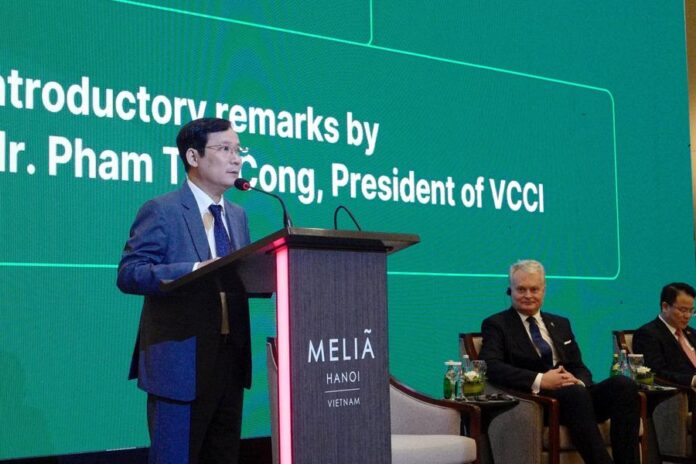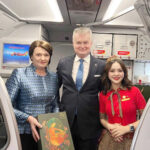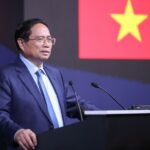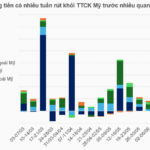On the occasion of the official visit to Vietnam by the President of Lithuania, Gitanas Nauseda, on June 12, the Vietnam Chamber of Commerce and Industry (VCCI) in collaboration with the Embassy of Lithuania in Singapore, concurrently accredited to Vietnam, organized the “Vietnam-Lithuania Business Forum.”
Lithuania has been a member of the European Union since 2004. Within the framework of cooperation between Vietnam and the EU, legal frameworks have been established to facilitate economic, trade, and investment activities between Vietnam and EU countries.
NOT FULLY CAPITALIZING ON EVFTA ADVANTAGES
Speaking at the forum, Mr. Pham Tan Cong, President of VCCI, emphasized that Vietnam and Lithuania have enjoyed over 30 years of diplomatic relations and have jointly preserved and developed the fine traditional relationship passed down by previous generations since its establishment in 1992.
Vietnam has always attached great importance to and wished to strengthen its relationship with Lithuania, a traditional friend and partner in the Baltic region of Central and Eastern Europe. Lithuania considers Vietnam its most important partner in Southeast Asia.
However, the VCCI leader candidly assessed that bilateral trade relations have not fully met the expectations and aspirations of the two governments, despite the signing of the European Union-Vietnam Free Trade Agreement (EVFTA) in June 2019.

Bilateral trade between Vietnam and Lithuania is currently modest, ranging between 100 and 150 million USD annually. In 2024, two-way trade turnover reached 200 million USD, a 7.5% increase compared to 2023.
In the first three months of 2025, two-way trade turnover reached nearly 100 million USD, up 94.4% over the same period last year. The main products exported from Vietnam to Lithuania include coconuts, Brazilian nuts and cashew nuts, rubber clothing, and rubber. The main products that Lithuania exports to Vietnam are wheat, positioning devices, and condensed milk.
“Up to now, businesses from both sides have not fully capitalized on the advantages brought about by the EVFTA to develop their business activities,” Mr. Cong remarked.
STRONG COOPERATION POTENTIAL
Highlighting the similarities between the two economies as an opportunity for bilateral trade to flourish, President of Lithuania Gitanas Nauseda stated that Lithuania and Vietnam represent two sides of the strategic partnership between the European Union and ASEAN. Despite the considerable geographical distance between the two countries, their economies share many similarities.
Vietnam is known as an economic star and one of the fastest-growing economies in the Southeast Asian region. It is a true success story. Similarly, Lithuania is also a success story within the European Union.
Another point of similarity is that both countries are focusing on reviving traditional growth drivers while emphasizing new ones, such as the digital economy, green economy, and creative economy based on knowledge and innovation.
The two countries possess strong cooperation potential in sectors such as food, textiles, and chemicals. Additionally, high value-added industries, including life sciences, information and communication technology, renewable energy, and mechanics, are also priority areas for collaboration.
Furthermore, Lithuania has made significant strides in renewable energy, particularly wind and solar power. Lithuanian solar panel manufacturers are keenly interested in participating in solar power projects in Vietnam.
The construction of Vietnam’s new LNG storage facilities has also attracted the attention of Lithuanian businesses. Lithuania has experience in developing LNG supply sources in Germany and Brazil and successfully operates the LNG Klaipėda station, the first LNG storage facility in the Baltic countries.

In the agricultural sector, Lithuania utilizes modern technology to produce high-value-added dairy, meat, and cereal products, exporting to over 150 countries worldwide. Lithuanian agricultural and food products also show promise in the Vietnamese market.
“These shared visions will form a solid foundation for economic partnerships that will benefit both Vietnam and Lithuania,” President Gitanas Nauseda asserted.
TAKING THE INITIATIVE TO EXPLOIT OPPORTUNITIES
Although the Lithuanian market is relatively small, it holds potential as a gateway for Vietnamese businesses to enter the Baltic markets. To further promote economic, trade, and investment cooperation between the two countries, the President of VCCI suggested that both sides should coordinate to capitalize on their potential advantages as gateways to the ASEAN and Central and Eastern European regions, while making better use of the opportunities presented by the Free Trade Agreement.
There is also a need to consider establishing embassies, direct flights, and cargo routes. Businesses themselves should be more proactive in seeking cooperation opportunities and promoting the export of their competitive products to each other’s markets.
“I believe that there is still a lot of potential, but you need to seize the opportunity and take advantage of the Vietnam-EU FTA to achieve better results in 2025 and the following years,” Mr. Cong proposed.
Affirming that economic and trade relations between Lithuania and Vietnam have much potential for development, President of Lithuania Gitanas Nauseda stated that the two sides should seize this opportunity to expand trade in goods and services. Businesses need to seek opportunities for expanded cooperation and turn agreements into concrete results.
At the forum, representatives from various ministries shared the view that both sides should increase delegation exchanges at all levels to maintain and promote bilateral cooperation, not only in the fields of economy, trade, and investment but also in other areas.
It is also crucial to continue disseminating information about the commitments and benefits of the EVFTA to the business communities of both countries to take advantage of the tariff preferences offered by the agreement and boost the import and export of their strong products.
Additionally, there is a need to share market information through bilateral dialogues and forums, enabling businesses to orient themselves toward the market and build long-term cooperative relationships.
Actively encouraging businesses from both countries to participate in exhibitions and trade fairs held in each country is essential to facilitate meetings between partners and create opportunities to expand export markets.
Notably, the transportation of goods between Vietnam and Lithuania is currently limited. Goods transported between the two countries are mainly carried by sea, resulting in relatively long transportation times (ranging from 35 to 60 days, depending on the shipping location).
Regarding air transport, the two sides are currently utilizing direct cargo services or transiting through other airports, which can be quite costly and only suitable for specific types of cargo.
Therefore, in the future, for the transportation of large volumes of goods and to optimize transportation time (around 25-30 days), the two sides should consider forming a rail transport route from Vietnam to Lithuania, combining it with the existing rail route from Vietnam through China to European countries.
During the forum, three memorandums of understanding and cooperation were signed between the Lithuania Industry Federation and the Vietnam Chamber of Commerce and Industry (VCCI); the Lithuanian Innovation Agency and the Vietnamese National Innovation Center (NIC); and the Klaipėda Port – Lithuania’s strategic seaport, and Haiphong Port.
The President of Lithuania Arrives in Hanoi Aboard Vietjet’s Private Jet
On the evening of June 11th, the President of the Republic of Lithuania, Gitanas Nauseda, and his wife arrived in Hanoi on a Vietjet private jet, commencing an official visit to Vietnam from June 11th to 12th. The visit was made at the invitation of the Vietnamese President, Luong Cuong.
A New Wave of Swedish Investment in Vietnam: The Prime Minister’s Vision
“On his official visit to the Kingdom of Sweden, on the afternoon of June 12th, Prime Minister Pham Minh Chinh, along with Sweden’s Minister for International Development Cooperation and Foreign Trade, Benjamin Dousa, co-chaired the Vietnam-Sweden Business Forum in Stockholm. The forum, themed ‘Green Transition, Digital Transformation, and Innovation,’ aimed to foster economic cooperation and innovation between the two countries.”
The Flow of International Capital: Opportunities for Vietnam?
In recent times, global investment patterns have witnessed notable fluctuations, with periods of capital outflows from the US market towards emerging and frontier markets, only to swiftly reverse course.





















